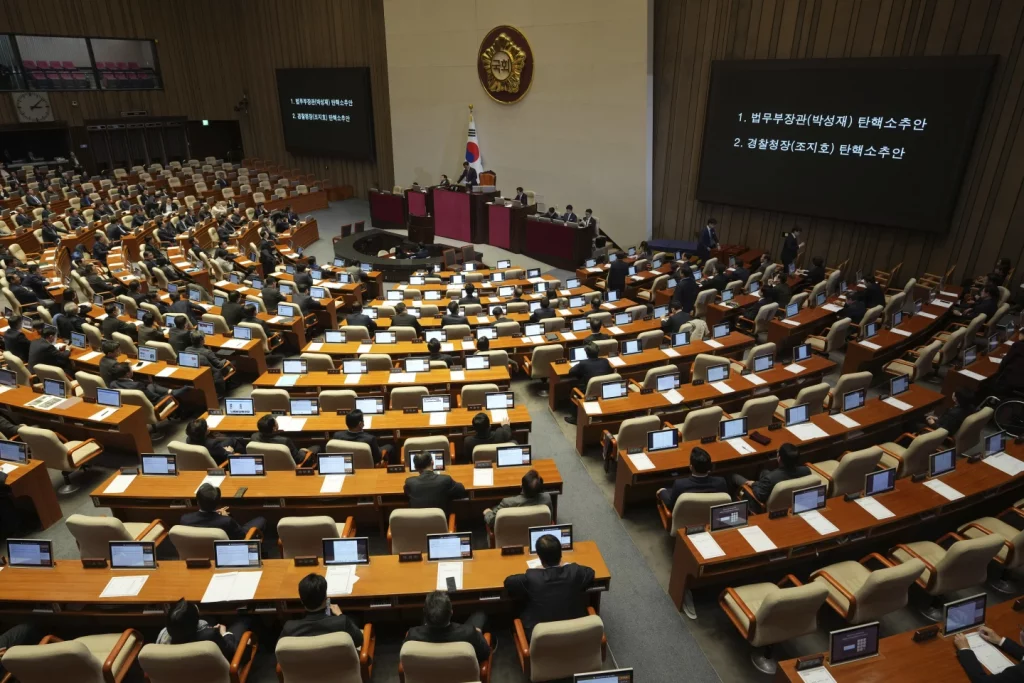South Korea is plagued by a deepening political crisis after two impeachment motions against two top leaders have been passed, one after the other, in an unprecedented development that has baffled the observers of that country. The Opposition-controlled National Assembly has voted to impeach acting President Han Duck-soo. It comes close on the heels of President Yoon Suk Yeol’s surprising imposition of martial law on 3 December and his ensuing impeachment on 14 December. The latest move by the Opposition means Han will be stripped of the powers and duties of the President until the Constitutional Court decides whether to dismiss or reinstate him. The court is already reviewing whether Yoon’s earlier impeachment can be upheld or not. The impeachments of the country’s two top political heads in such quick succession have exacerbated the political turmoil, deepened economic uncertainties and lowered the country’s image internationally.
The single-chamber National Assembly passed Han’s impeachment motion with a 192-0 vote. Lawmakers of the ruling People Power Party (PPP) boycotted the vote and tried to mob the Assembly Speaker Woo Won Shik shouting that the vote was invalid. They even demanded Woo’s resignation protesting against his ruling that the passage of the impeachment motion required a simple majority in the 300-member assembly, not a two-thirds majority as claimed by the PPP. The problem with the South Korean system is that there are no specific laws on the impeachment of an acting president.
Reacting to the impeachment announcement, Han said it was regrettable but added that he respected the assembly’s decision and would suspend his duties so as not to “add to the existing confusion and uncertainty.” He declared he will wait for “a swift, wise decision” by the Constitutional Court.
Han’s powers were officially suspended after copies of his impeachment document were delivered to him and the Constitutional Court. The Deputy Prime Minister and Finance Minister, Choi Sang-mok, has taken over the duties. Since South Korea can ill afford to be in a state of political turmoil, given the belligerence of its neighbour – North Korea-, Choi’s office immediately instructed the military to boost its readiness to prevent North Korea from miscalculating the situation and launching provocations. He also told the foreign ministry to inform the United States, Japan and other major partners that South Korea’s foreign policies remain unchanged.
Han could have survived had he not crossed swords with the main liberal opposition Democratic Party by stonewalling the latter’s efforts to fill three vacant seats on the Constitutional Court, establish an independent investigation into Yoon’s martial law decree and legislate pro-farmer bills. The demand for the approval of the assembly’s nominations of three new Constitutional Court justices stemmed from the anxiety of the Opposition to have the court’s full nine-member bench ahead of its ruling on Yoon’s impeachment. A court decision to dismiss Yoon as President needs support from at least six justices, and adding more justices will likely increase the prospects for Yoon’s ouster. Yoon’s political allies in the governing party oppose the appointment of the three justices on the plea that Han should not exercise the presidential authority to make the appointments while Yoon is yet to be formally removed from office. Han decided to oblige them by announcing that he would not appoint the justices without bipartisan consent. In response the Democratic Party, which holds a majority in the assembly, submitted an impeachment motion against Han and passed bills calling for the appointment of three justices.
South Korean investigative agencies have been deployed to find out whether Yoon committed rebellion and abuse of power with his martial law decree, which had to be rescinded within six hours of its promulgation due to mass protests. Yoon has repeatedly ignored requests by authorities to appear for face-to-face questioning. His defence minister, police chief and several other military commanders have already been arrested over the deployment of troops and police officers to the National Assembly.
South Korea is effectively sending out the message across the globe that it will not tolerate any attempt to subvert democracy. This is a remarkable development at a time when autocratic leaders and parties are entrenching themselves in many countries. It is to be seen whether the South Korean experience augurs well for the democratic process the world over.
